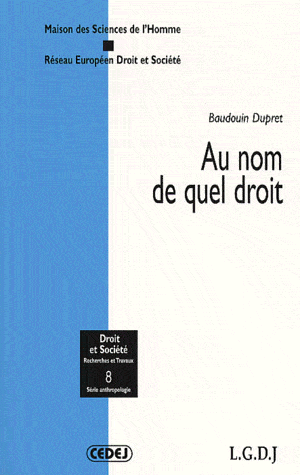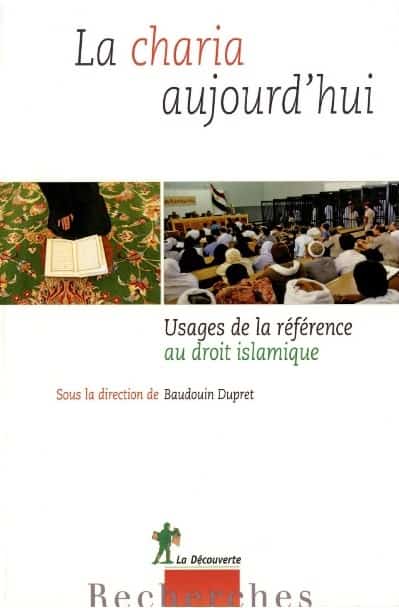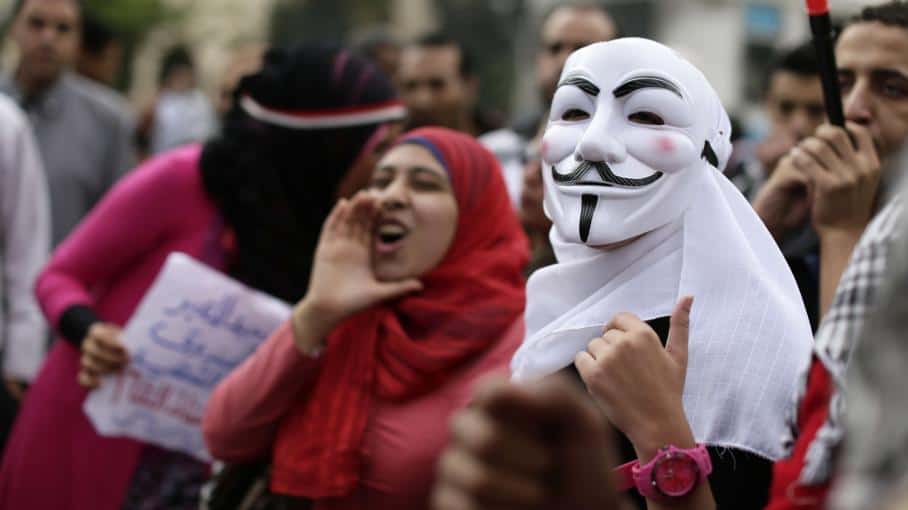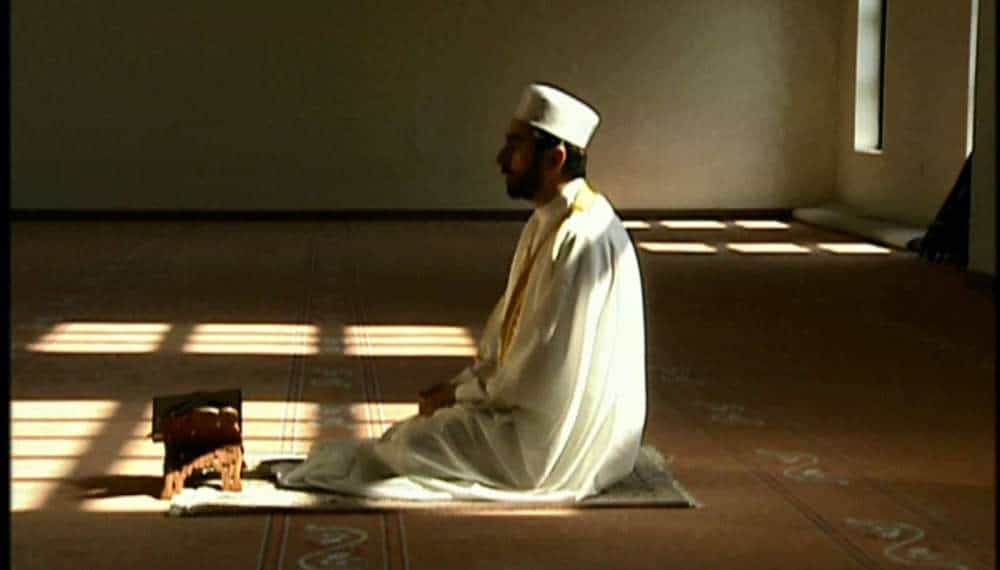In the context of its thematic week on the anthropology of Islam, Allegra met Islamologist Baudouin Dupret for a virtual interview. He shares with us some of his insights on how to study and understand Islamic law.
Baudouin Dupret is senior research fellow at the Centre National de la Recherche Scientifique (CNRS) and since September 2010, Director of Centre Jacques Berque for Humanities and Social Sciences in Rabat, Morocco. He specialises in theoretical, sociological and anthropological approaches to the law, with a specific focus on Arab societies. He is the author of numerous books and articles investigating ‘law in action and in context’ and has become a leading expert on Shariah.
Allegra: In your first book ‘Au nom de quel droit’ published in 2000, your main argument is that the study of the law and norms in Egypt necessitates a move away from cultural explanations. Can you explain the scientific context in which this book was written? Why do you find it necessary to ‘write against culture’?
 Baudouin: I did not write ‘against culture’ but I wrote against explanations through culture. It is not exactly the same. This book is the result of my doctoral thesis which was the reflection of my training on the one hand, and my personal interest in the Egyptian context on the other. My training is composite: I am both a lawyer and an Islamologist and I speak Arabic. When trying to combine these different skills, I thought it would be interesting to work on the use of Shariah in the context of a country like Egypt, which is a country where the law, at least from a formal point of view, is very close to French law. I wanted to know how references to Islam could be integrated into a legal regime very similar, for historical reasons, to the French one.
Baudouin: I did not write ‘against culture’ but I wrote against explanations through culture. It is not exactly the same. This book is the result of my doctoral thesis which was the reflection of my training on the one hand, and my personal interest in the Egyptian context on the other. My training is composite: I am both a lawyer and an Islamologist and I speak Arabic. When trying to combine these different skills, I thought it would be interesting to work on the use of Shariah in the context of a country like Egypt, which is a country where the law, at least from a formal point of view, is very close to French law. I wanted to know how references to Islam could be integrated into a legal regime very similar, for historical reasons, to the French one.
What appeared very clearly was that we had to move away from cultural explanations. Because in a context like Egypt, law does not function through Muslim or Egyptian references only but is rather a game of repertoires. Sometimes, an Islamic repertoire was mobilised and sometimes a modernist one. Sometimes, French law was used and sometimes references to Shariah were made. These dynamics answered situational logics. It all depended if it was a judge, a lawyer or a politician who was answering me. It seemed very clear from the start that the explanation through Islam or through Islamic culture would not bring me very far.
This is the reason why I am anti-culturalist in the sense that I think we explain nothing by saying that Egypt, because it is a Muslim majority country, should be explained through its Islamic culture; all the more so that we do not know what this ‘Islamic culture’ is. What are the important elements of this ‘Islamic culture’ that would help us explain the functioning of justice in Egypt? So we need to mobilize other types of explanations.
During your entire career, you have advocated for a ‘praxeological approach’ to the study of the law. Why, in your opinion, is such an epistemological shift important?
 When dealing with Muslim majority countries, there is a tendency to put forward the Islamic factor in a way that is exaggerated compared to people’s everyday life. Often, what is overlooked is precisely what matters, i.e people’s ordinary practices: What do people do? When they go to court, what do they do with the law? How do they use the law? Often these explanations are ignored in favour of broader discussions on Islam, which reflect more our own fantasies as Westerners than the everyday concerns of ordinary people. So what I mean by ‘praxeologic’ is an approach of the law in practice and in action. In my work, I wanted to show how the law, as practiced in courts, law firms, Public prosecutor’s departments, worked in the Egyptian context.
When dealing with Muslim majority countries, there is a tendency to put forward the Islamic factor in a way that is exaggerated compared to people’s everyday life. Often, what is overlooked is precisely what matters, i.e people’s ordinary practices: What do people do? When they go to court, what do they do with the law? How do they use the law? Often these explanations are ignored in favour of broader discussions on Islam, which reflect more our own fantasies as Westerners than the everyday concerns of ordinary people. So what I mean by ‘praxeologic’ is an approach of the law in practice and in action. In my work, I wanted to show how the law, as practiced in courts, law firms, Public prosecutor’s departments, worked in the Egyptian context.
A recent trend in the study of Islam was initiated in the wake of Talal Asad’s book ‘The Idea of an Anthropology of Islam’ in which he suggests envisioning Islam as a discursive tradition. Authors like Saba Mahmood and Charles Hirshkind, for instance, have been particularly attentive to underlining the relationships between the power of Islamic ideals of morality and piety, the connections between everyday religiosity and religious knowledge, as well as the interconnections and tensions between Islamic practices of piety and the architecture of secular power. Their focus on ‘piety’ and ‘morality’ seems to initiate a return to cultural readings of Islam. What is your view on this literature? Do you find the definition of ‘morality’ it offers helpful to understand the relationship between law and morality in contemporary Arab societies?
Personally, I am quite critical of this new tradition initiated by Talal Asad, even though it is an interesting approach, very rich and very structured. So my critique does not dismiss the importance of this argument but it seems to me that we are dealing here with an avatar of a Foucauldian approach – which has had a strong influence on the Anglo-Saxon world – applied to Islam. This Foucauldian approach to religion, morality and the law tends to generalise too much. It pretends to tell us what the law, religion and Islam are about. Islam would be a ‘discursive tradition’.
Personally, my ethnographic experience demonstrates that Islam is extremely varied and that the discursive dimension sometimes intervenes but in other situations, it does not. This disciplinary conception of morality and religion is problematic because it is monolithic and essentializing, and because I am not sure that morality and religion are systematically disciplinary. My work takes inspiration from another tradition, which also comes from the Anglo-Saxon world : ethnomethodology as defined by Harold Garfinkel and used by many other authors, even though it remains a relatively marginal tradition. This approach says that there aren’t systematic disciplinary or discursive practices. There are situational logics and context that determine the many forms religion, morality, and the law can take. We cannot speak generally. We need to ground our analysis in ethnography. We need to figure out how practices are defined according to the specific contexts in which they occur.
You say that religion and morality are not necessarily of a disciplinary nature. But how do you explain that certain codes of conducts and values are transmitted and reproduced?
What bothers me is the idea that morality and religion are of a disciplinary nature. Of course, there are disciplinary dimensions that can be found in many practices. For instance, the taste for virtue can be found in many places in the Muslim world and elsewhere. It would be absurd to negate this. What I contest is the systematic aspect of discipline that is perceived as constituting the founding principle of morality and religion. There are forms of piety that are not disciplinary. For example, praying is not always disciplinary; it can also be mystical. And legal approaches are not necessarily disciplinary: they can be technical or positivist. This is true for all religions and for Islam in Egypt and Morocco.
As for the second part of your question: how are religions transformed? I do not specifically work on this. I am more interested on how religion unfolds in the present and the way it unfolds is often very banal. As Garfinkel puts it, most of the things we do in our everyday are seen but unnoticed. Because of our education and our socialization, we take for granted most of the things we routinely do.
Most of the time, we do not reflect on our actions. It is the work of the social scientist to look at the things that are seen but unnoticed because they are unremarkable in the accomplishment of everyday life. It is also true in the Muslim context: all these references to Islam that are used to say ‘hello’, ‘thank you’, ‘maybe’…to be polite, to make law or to express taste…are anchored in the banality of the everyday. This is the reality that we need to describe because it is constitutive of people’s lives and experiences.
Hussein Ali Agrama has qualified the Egyptian revolution an ‘asecular revolution’. This term ‘specifies a situation not where norms are no longer secular, but where the questions against which such norms are adduced and contested as answers are no longer seen as necessary’. In short, popular questionings around the creation of the conditions of possibility of democracy are indifferent to the issue of a strict separation between religion, politics and the law. In a recent article you wrote, you seem to come to a similar conclusion. How do you envision the future of democracy in the region?

First, I don’t think that religion has been at the centre of democratic debates. It is our Western analytical framework that wants to link the issue of ‘secularism’ with the issue of democracy. However, it would be wrong to think that the question of the relationship between religion and politics has had no effect in the recent revolutionary movements. If we look at the debates in Tunisia, which is the only country where the revolutionary process achieved something substantial, the issue of the religion’s place in the constitution and in political life has been central in the conflicts that have divided the various parties. We cannot say that the issue of secularism is not pertinent in the democratic debate in Arab and Muslim countries. It goes against the evidence as we observe it, at least in Tunisia.
This being said, this does not mean that it is the French conception of secularism (laïcité) that imposes itself in these countries when the relationship between religion and politics is discussed. Maybe the notion of ‘state neutrality’ in religious affairs, as it exists in Belgium or in Germany, is more adequate to describe the transformations that are currently taking place in the Arab world.
What I denounce in this article is a tendency to explain the current political difficulties of the Arab world by the religious factor, which is often envisioned in a monolithic manner. Variations in Islam are as many as the number of Muslims living on earth. It is absurd to explain the difficulties of the Arab world by something that would be inherent to Islam. This type of explanation is very similar to the ones that theologians or radical Muslims want to promote: the idea that there is an eternal Islam with fundamental values and quasi-genetic properties, an Islam that is fundamentally opposed to secularism and that can only flourish in a theocracy. The explanation remains the same: Islam would be unique, genetically determined, and endowed with fundamental qualities.
The new Tunisian constitution that was voted in January this year does not mention Shariah as a source of guidance for law makers. However, the state remains the guardian of the sacred. What is the relationship between positive law and the reference to Islam?
 Indeed, the Tunisian constitution does not make any reference to Shariah. Ennahda, the Islamic party, was ready to give up on this and was not really attached to having Shariah mentioned there. As Al-Ghannushi, the leader of Ennahda, phrased it: ‘More than 90% of our laws are already in conformity with Shariah’. Ennahda considered it more effective to Islamise from below through the moralisation of society than to do so from above, through politics, the constitution and the law. So, formally references to Shariah have been abandoned.
Indeed, the Tunisian constitution does not make any reference to Shariah. Ennahda, the Islamic party, was ready to give up on this and was not really attached to having Shariah mentioned there. As Al-Ghannushi, the leader of Ennahda, phrased it: ‘More than 90% of our laws are already in conformity with Shariah’. Ennahda considered it more effective to Islamise from below through the moralisation of society than to do so from above, through politics, the constitution and the law. So, formally references to Shariah have been abandoned.
However, some techniques have been used to avoid the total exclusion of Shariah from the legal and constitutional order. As soon as it is said that Islam is the state religion, and that the state is the guardian of the sacred, there is a possibility for tribunals to activate this reference to Islam and, indirectly, the reference to Shariah. For example, if one wants to demonstrate that a law or a behaviour is contrary to Islam, since the state has the responsibility to protect Islam, it becomes possible to activate Shariah in courts. So Shariah has been excluded from the front door, but it can come back by the back door, in an indirect way.
But as usual, it will be judges’ practices that will determine the outcomes. In a society where the majority of the judges are conservative andwould like to have Islamic norms regulate affairs, there is a door open for them to do so. But if judges tend to be liberal, and want to exclude religious referents from everyday judicial practice, it is also possible for them to do so. So here we see that a Constitution does not regulate everything. It is simply a framework that is inhabited by people at the political and legal levels. Only the future can tell us where Tunisia is heading. Often, we observe contradictory trends. Some judges are more conservative and make reference to Shariah as often as they can. Other judges are more progressive, and try to secularise the law through practice.
There are also progressive approaches to justice that make reference to Shariah…
Indeed, Shariah is nothing outside practice. Shariah is nothing outside its many uses. One can have a progressive approach to Shariah. There is no fatality in Shariah. However, what we can observe is that dominant readings of Shariah today are extremely conservative and disciplinary. This does not mean that Shariah is conservative by nature. There is the current Moroccan Prime Minister who explained that Shariah, in his view, meant a return to morality in society. However, he thought that Shariah is outdated from a penal point of view. Koranic punishments (Hudud), in his opinion, had no place in modern Moroccan society. However, he considered Shariah as the fight against corruption, justice for everyone and equality. These were the words of an Islamist and conservative person. So we see that this term has no essential meaning. We need to look at the meanings that people attribute to it.
If democracy in the Arab world is gradually finding its own path, Europe has opened up possibilities for Muslims to experiment with Islamic norms. This has given rise to interesting new assemblages such as Islamic finance, ‘halal’ dating sites or law firms specialising in Islamic law. In the meantime, the increased visibility of Islam in the public sphere has triggered moral panics around identity. The immediate reaction of a number of European governments has been to pass laws aiming at regulating this visibility. How do you interpret such developments?
There is a variety of Muslims in Europe and situations across Europe are also very different. You take the example of Islamic finance: Islamic finance is essentially a response of banks to the accumulation of capital by monarchies in the Gulf. It has nothing to do with the migration of people of Muslim origin to Europe or the US. Islamic finance is a relatively new invention. It is derived from the forbidding of usury in the Koran. The word ‘riba’ means usury, that is to say excessive interest and not the interest rate as we understand it in Western banking systems. An entire doctrine was developed around the usury ban and because a huge amount of capital is in the hands of people who want to present themselves as pious and virtuous Muslims, financial techniques had to be developed in order to satisfy them. So what we observe is the creation of a doctrine that did not exist beforehand. Before that, the fiqh, the Islamic jurisprudence, did not discuss this.
Now, the presence of a significant Muslim population in Europe is also an important factor. However, people who consider themselves as Muslims do not necessarily want to make visible their religious belonging in public. For many, this should not be a public issue. Many Muslims in Europe are Muslims sociologically but have no religious practice. We have to take them into account too. We should not only focus on Muslims who ask for the visibility of Islam in public. Demands for the recognition of Islam in public take different forms, in the law, in politics, identitarian forms too. The positive aspect of these claims is that they question our conceptions of democracy and of secularism. From this point of view, very good questions have emerged.
Often, authorities tend to deny Muslims what they have accepted for Jews and Christians. This confrontational posture towards Islam is not positive for our democracy.
So good questions are asked and the responses that Muslims bring are varied and contrasted. Some believe that what they consider as essential to their faith should be acknowledged and others think that religion should be relegated to the private sphere only. Now, the crisis exacerbates identitarian feelings. It would be false to believe that the crisis had no impact on the identitarian exaltation of a political party like the National Front and its leader, Marine Le Pen. In this context, any form of foreignness and ‘otherness’ that allows one to form identities are useful for these parties. Debates on ‘halal food’, the veil or Shariah are means to exalt one’s own identity and to build one’s own political agenda. These debates do not concern Muslims: they are instrumentalised for political ends.







